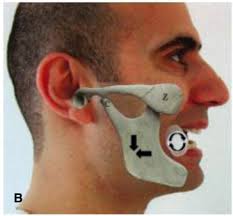
TMJ Dysfunction Symptoms
TMJ is an abbreviation commonly used for temporomandibular joint, right and left joints , located in front of the ears ,its responsible to attach the lower jaw to the skull and control mouth movement( opennining ,Closing ,side movements) .
Symptoms of TMJ disorder can range from minor discomfort and inconvenience to extremely painful, dysfunction The most common symptoms are pain or loss of movement in the jaw, earache, headache, popping or clicking sounds when opening and closing mouth, facial muscle pain, and dizziness.
TMJ symptoms occur when the joint and the muscles of mastication (chewing muscles) do not work together correctly. This can lead to more serious conditions, early detection and treatment is vitally important.
Generaly, to successfully manage TMJ disorder the cause must be identified and treated. But no single treatment can resolve TMJ disorders and usually treatment takes time to resolve the issue.
TMJ Disorders causes
Can occur at any age; equal incidence among males : females . Some of the most common causes that can produce TMJ disorders:
- Bruxism
Considered as para functional habit and the most common cause is due to emotional stress leading to overworking the muscles of mastication (chewing muscles) resulting in muscle fatigue, inflammation, soreness, spasm and tenderness on one hand and. joint inflammation, and pain on the other hand.
TMJ treatment due to bruxism depends on the patient’s persistence to the habit if not discontinued . Typically Treatment includes patient education, occlusal splint (night guard), stress management, pain relievers, soft diet, exercises, and occasionally muscle relaxants.
. Trauma
Acute traumatic injury to TMJ produces a sprain resulting in joint tissues bruising , inflammation, pain and stiffness resulting in mouth opening limitation .
Bruising is treated with soft diet for several weeks, anti-inflammatory pain relievers (Voltarin . Ibuprofen) and ice packs in the first 72 hours followed by warm ones. It takes about four to six weeks to resolve the issue as long as maintaining a soft diet.
Severe traumatic injuries can result in internal damage to the TMJ and tearing of the disc or its posterior attachment resulting in clicking or popping , crepitus (grinding sound), pain and limitation of opening. this case may require extensive treatment and conservative treatment may not be enough.
- Rheumatoid Arthritis
In this condition several other joints are affected followed by TMJ and undergo degeneration.
- Malocclusion
A malocclusion (mismatching bite) creates stress on the muscles of mastication (chewing ) contributing to muscle spasm, muscle pain, joint pain, clicking, crepitus (grinding sound), closed lock and other issues.
TMJ disorders caused by malocclusion must be treated by correcting the malocclusion and reestablish normal function in order to relieve the pain.
- Postural Problems
Patients with neck or back pain often thrust the upper part of their body unconsciously slightly forward in attempt to relieve pressure on the spine. This causes a small constant stretch of the ‘strap muscles’ creating a small continuous force on the mandible pulling it backward . The disc becomes a bit forward misaligned in relation to the mandibular condyle.
Treatment for TMJ disorder due to a postural issues includes identifying and correction of the underlying postural cause , occlusal splint therapy, physical therapy, patient education, soft diet, pain medication, muscle relaxants .
Leave a reply →
Leave a reply